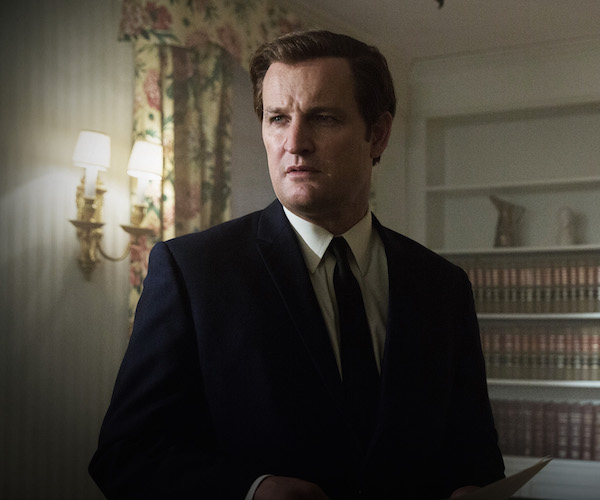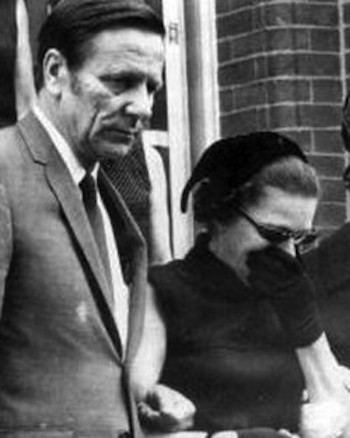Film Commentary: Cast in “Chappaquiddick” — An Actor’s Perspective
Chappaquiddick may satisfy some for whom Ted Kennedy was overdue for a comeuppance.

A scene from “Chappaquiddick.”
By Tim Jackson
When I read for a part in the new film, Chappaquiddick, I was told by casting agent Angela Perri, “I think you’ll be perfect for this role.” That I rarely hear. It’s as likely that I resemble a character as when Unsolved Mysteries found my face untrustworthy enough to play “Lefty’’ Gilday, who, in 1970, helped revolutionaries Susan Saxe and Kathy Powers rob a State Street Bank. But this time, success. My mournful countenance and a low-key audition led me to be cast as the real-life Joe Kopechne, the father of poor Mary Jo Kopechne, Chappaquidick victim.
To recap: on July 18 1969, Senator Ted Kennedy and Mary Jo attended a party in a rented cottage on Martha’s Vineyard with six young female campaign workers called the “Boiler Room Girls.” Afterward, Ted was giving Mary Jo a ride (to the ferry?) in his Oldsmobile when he missed a turn and his car tumbled off the Dike Bridge into a channel off Poucha Pond. Kennedy escaped; Mary Jo Kopechne died in the car of asphyxiation. When Ted Kennedy offered his explanation of what happened to reporters, Joseph and Gwen Kopechne (Charlotte Anne Dore), Mary Jo’s parents, sat and watched it on TV from New Jersey.
The details of Kennedy’s behavior following the accident is puzzling and many questions remain about his culpability in Mary Jo’s death. The film also leaves many of those gaps open to speculation. It focuses on the characters who surrounded Kennedy following the accident, some to the point of caricature.
Jason Wright, an Australian actor who bears a resemblance to Ted Kennedy, avoids the trap of a poor Massachusetts accent, particularly the upper class Kennedy variation. Wright’s performance is an earnest depiction of the young senator as a man cowed by a family legacy of accomplishment, traumatized by the assassination of two brothers, and now over his head in deceit and compromise. Kennedy hems and haws searching for a way to save his reputation.

The Kopechnes at their daughter’s funeral.
Ed Helms plays Joe Gargan, a close Kennedy cousin, who pleads with the senator to come clean about the accident. He is continually hampered by Kennedy’s inability to come forward with straight facts. Comedian Jim Gaffigan is lawyer Paul Markham. These two actors, known mainly as comedians, orbit the rudderless Kennedy. Helms’s presence is intentionally lightweight. Gaffigan waddles around as an ineffective but obedient Markham. Meanwhile, papa Joe Kennedy’s cigar-chomping attorneys take over. Bruce Dern is brilliantly comic as the patriarch of the clan, Joe Kennedy. As his son nervously calls to confess that he is in a heap of trouble Joe Kennedy, wheelchair bound, contorted and suffering from what appears to have been a stroke, manages to slowly croak one word of advice: “Alibi!”
The screenplay by Taylor Allen and Andrew Loganis is properly researched. The facts are as accurate as reported in newspapers and in court records. Without a doubt this is a tragic story. It is also, as a movie, a pitch-black comedy of manners. Director John Curran has fashioned some darkly comic juxtapositions. Kennedy’s sinking back into a bathtub as Mary Jo gasps for air in the submerged vehicle may be the darkest. Many involve the senator’s need to redirect the tragedy toward his own misfortune. He famously chose to wear a neck brace at the Kopechne funeral as a sympathy ploy: “OK, the neck brace was a bad idea,” he later admits. The film doesn’t go for the jugular but leaves no doubt about Kennedy’s efforts to put appearance and performance ahead of truth.
Curran (Tracks, The Painted Veil) is a smart director notable for capturing the look and behavior of people in particular social settings. He directs Chappaquiddick with an artist’s eye for visual detail, including the casting of local actors in smaller parts who resemble those actually involved. Some of the performances border on parody. Boston actors John Fiore as Chief Arena and Joe Zamparelli as Officer Huck are befuddled by the Senator’s changing stories. Each sport a conspicuous pot belly in uniforms that seem too tight. Arena’s hat is too small for his head. If you doubt the intention to make characters comical, watch for Kennedy’s last speech as Gargan makes one last plea for his cousin to speak the truth.
Chappaquiddick may satisfy some for whom Ted Kennedy was overdue for a comeuppance. I’m tempted to say that the moment of greatest pathos occurs when I‘m on screen, a scene in which Joe and Gwen Kopechne sit grim-faced as they chain-smoke in front their television watching Kennedy’s conciliatory version of the truth. However, that would be blatantly self-serving. Besides you might blink and miss the moment altogether.
Tim Jackson was an assistant professor of Digital Film and Video for 20 years. His music career in Boston began in the 1970s and includes some 20 groups, recordings, national and international tours, and contributions to film soundtracks. He studied theater and English as an undergraduate, and has also has worked helter skelter as an actor and member of SAG and AFTRA since the 1980s. He has directed three feature documentaries: Chaos and Order: Making American Theater about the American Repertory Theater; Radical Jesters, which profiles the practices of 11 interventionist artists and agit-prop performance groups; When Things Go Wrong: The Robin Lane Story, and the short film The American Gurner. He is a member of the Boston Society of Film Critics. You can read more of his work on his blog.
